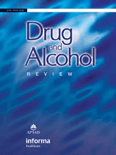
DRUG AND ALCOHOL REVIEW
Scope & Guideline
Bridging disciplines to tackle addiction challenges.
Introduction
Aims and Scopes
- Substance Use Epidemiology:
Research examining the prevalence, patterns, and trends of substance use across different populations, including specific groups like adolescents, indigenous communities, and individuals with co-occurring mental health issues. - Intervention and Treatment Strategies:
Studies evaluating various treatment modalities for substance use disorders, including pharmacological treatments, behavioral therapies, and harm reduction approaches. - Policy Analysis and Development:
Research focused on alcohol and drug policy, including the impact of legislation, regulatory frameworks, and public health initiatives on substance use and related harms. - Psychosocial Factors and Substance Use:
Investigations into the psychosocial determinants of substance use, including the influence of family, peers, and social norms. - Health Outcomes Related to Substance Use:
Research assessing the health consequences of substance use, including physical health, mental health, and societal impacts. - Innovative Research Methodologies:
Utilization of novel research methods, including digital health interventions, data linkage studies, and qualitative approaches to enhance understanding of substance use issues. - Cultural and Contextual Influences:
Examinations of how cultural, socioeconomic, and geographic factors influence substance use behaviors and treatment access.
Trending and Emerging
- Digital Health Interventions:
There is a growing emphasis on the use of digital tools and telehealth strategies for substance use treatment, reflecting the adaptation to remote care models and the need for innovative approaches. - Intersectionality in Substance Use:
Research increasingly focuses on the intersectionality of gender, ethnicity, and socioeconomic status in understanding substance use patterns, emphasizing the importance of tailored interventions. - Harm Reduction Strategies:
An increase in studies exploring harm reduction methods, such as supervised consumption sites and drug checking services, indicates a shift towards prioritizing public health over punitive measures. - Impact of COVID-19 on Substance Use:
Many recent studies are examining the effects of the COVID-19 pandemic on substance use behaviors, treatment access, and policy changes, highlighting the need for adaptive strategies in crisis contexts. - Youth Substance Use Trends:
There is a noticeable rise in research focused on youth substance use, particularly concerning the influences of social media and peer dynamics, as well as prevention strategies. - Longitudinal and Cohort Studies:
An increasing trend in the use of longitudinal studies to track substance use patterns over time is evident, providing valuable insights into long-term outcomes and intervention efficacy. - Cultural Competence in Treatment:
Emerging themes focus on culturally responsive treatment approaches for diverse populations, particularly Indigenous communities, emphasizing the need for culturally tailored interventions.
Declining or Waning
- Traditional Substance Use Treatments:
There seems to be a waning focus on traditional treatment approaches without integration of modern methodologies, as newer studies emphasize innovative and integrated treatment models. - Generalized Substance Use Disorders:
The exploration of broad substance use disorders without specific contextual factors is decreasing, with more emphasis now placed on targeted populations and unique demographics. - Alcohol Consumption and General Public Health:
Research concentrating solely on alcohol consumption rates without a corresponding analysis of interventions or policy implications is becoming less frequent, reflecting a shift towards actionable findings. - Descriptive Studies without Policy Implications:
There is a noticeable decline in purely descriptive studies that do not link findings to policy recommendations or practical applications in the field of substance use treatment.
Similar Journals

Harm Reduction Journal
Championing effective strategies in medicine and public health.Welcome to the Harm Reduction Journal, a premier academic platform published by BMC, dedicated to advancing the field of harm reduction since its inception in 2004. With an impressive track record as an Open Access publication, this journal addresses critical topics within the broad scope of medicine, psychiatry, and public health, making it indispensable for researchers, healthcare professionals, and students alike. As of 2023, it proudly holds a Q1 ranking in prestigious categories including Medicine (Miscellaneous), Psychiatry and Mental Health, and Public Health, Environmental and Occupational Health, reflecting its high impact and significance in the academic community. The journal is notable for its comprehensive discussions on innovative harm reduction strategies, public policy considerations, and evidence-based practice, fostering collaboration and knowledge exchange. With a global reach and commitment to enhancing health outcomes, the Harm Reduction Journal serves as a vital resource in the ever-evolving landscape of public health and addiction research.
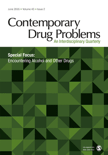
CONTEMPORARY DRUG PROBLEMS
Navigating the Intersection of Law, Health, and Drug UseCONTEMPORARY DRUG PROBLEMS is a distinguished academic journal published by SAGE PUBLICATIONS INC, focusing on critical issues within the realms of drug policy, health advocacy, and law. With a legacy dating back to its inception in 1973 and a noticeable convergence in subsequent years, the journal serves as a vital forum for researchers, practitioners, and policymakers engaged in understanding the multifaceted challenges related to drug use and its societal impacts. Holding an impressive Q2 ranking in both Health Policy and Health (social science), and a Q1 distinction in Law, the journal positions itself as an essential resource for advancing knowledge and fostering dialogue in these essential fields. Although it operates under traditional access models, its wide-ranging insights make it indispensable for those who aim to contribute meaningfully to the discourse surrounding contemporary drug issues. With its robust Scopus rankings, including a significant 89th percentile in Social Sciences Law, CONTEMPORARY DRUG PROBLEMS remains a pivotal source for scholars and professionals alike, striving to address and mitigate the complexities of drug-related problems on both a legal and social front.
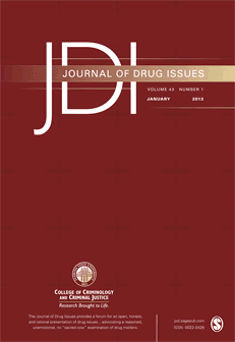
JOURNAL OF DRUG ISSUES
Advancing Knowledge in Drug ResearchJOURNAL OF DRUG ISSUES, published by SAGE PUBLICATIONS INC, serves as a pivotal platform for researchers and professionals dedicated to the multifaceted exploration of drug-related topics across various fields, including health, medicine, psychiatry, and public health. With an ISSN of 0022-0426 and an E-ISSN of 1945-1369, this esteemed journal has maintained a consistent output since its inception in 1971 and is set to continue its contributions through 2024. Reflecting its high academic standards, it has achieved a Q2 ranking in Health (Social Science) and Q3 rankings in several related categories, underscoring its relevance and influence among scholarly work. The journal is indexed in Scopus, with respectable rankings in various medical and health-related disciplines, highlighting its role as an essential resource for those invested in the vigorous discourse surrounding drug issues. Although not an open-access publication, the journal ensures that access to its extensive research findings remains available to a broad audience, solidifying its importance in advancing knowledge and informing best practices in the field.

Nordic Studies on Alcohol and Drugs
Empowering Knowledge Sharing on Substance Use in the NordicsNordic Studies on Alcohol and Drugs is a leading peer-reviewed journal published by SAGE PUBLICATIONS LTD, dedicated to advancing the understanding of alcohol and drug use from a Nordic perspective. Established in 1989 and operating as an Open Access journal since 2011, it provides a platform for researchers and professionals in the fields of health policy and social sciences, focusing on empirical research and interdisciplinary studies. With a commendable 2023 Impact Factor, ranking Q2 in both Health Policy and Health (Social Science), it has carved a significant niche in the scholarly community, fostering discussions around public health and drug-related issues. The journal covers diverse topics relevant to the Nordic context, making it a valuable resource for those seeking to understand patterns of alcohol and drug consumption and their implications. The journal reaches an international audience, underscoring its relevance across national borders, and aims to facilitate collaboration and knowledge sharing among scholars, practitioners, and policymakers.
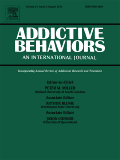
ADDICTIVE BEHAVIORS
Advancing Understanding of Addictive BehaviorsADDICTIVE BEHAVIORS is a prestigious journal published by PERGAMON-ELSEVIER SCIENCE LTD, specializing in the critical examination and exploration of addiction-related issues across diverse fields including Clinical Psychology, Psychiatry and Mental Health, and Toxicology. With a robust history dating back to 1975 and convergence extending to 2024, the journal is esteemed for its rigorous peer-reviewed research that contributes significantly to understanding addiction phenomena. Ranked in the Q1 category for its focus areas, it stands out within the academic community, evidenced by its impressive Scopus rankings—25th in Clinical Psychology and 14th in Toxicology—placing it in the top tier of its disciplines. This journal offers valuable insights into addiction behaviors, treatment methodologies, and public health implications, making it an essential resource for researchers, practitioners, and students seeking to advance their knowledge and impact the field. Although not Open Access, it provides vital access options for institutions and individuals invested in addiction studies.
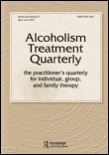
Alcoholism Treatment Quarterly
Exploring Innovative Solutions for Alcohol Use DisordersAlcoholism Treatment Quarterly is a reputable journal dedicated to advancing the understanding of alcohol use disorders and their treatment. Published by Routledge Journals, Taylor & Francis Ltd, this journal has established itself as an essential resource within the fields of Medicine and Psychiatry and Mental Health, evidenced by its placement in the Q3 category for both disciplines in 2023. With a comprehensive scope covering the multifaceted aspects of alcoholism treatment, the journal serves as a vital platform for researchers, clinicians, and students to share and access high-quality, peer-reviewed articles. Although it is not an open-access journal, it is widely recognized for its contribution to the field, having been in continuous publication since 1984 and looking forward to its 40th anniversary in 2024. The journal aims to promote evidence-based practices and foster discourse on innovative treatment methods and research trends, making it an indispensable asset for anyone involved in the prevention and treatment of alcohol-related issues.
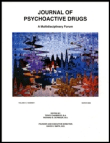
JOURNAL OF PSYCHOACTIVE DRUGS
Bridging Psychology and Medicine Through Drug ResearchJOURNAL OF PSYCHOACTIVE DRUGS, published by Routledge Journals, Taylor & Francis Ltd, stands as a leading resource in the fields of psychology and medicine, focusing on the intersection of psychoactive substances and their impact on human behavior. With an ISSN of 0279-1072 and E-ISSN 2159-9777, this esteemed journal has been a pivotal platform for rigorous research since its inception in 1967, contributing to the understanding of drug use, its societal implications, and therapeutic potentials. It currently holds a Q2 ranking in both the miscellaneous categories of Medicine and Psychology for 2023, reflecting its significant standing within academic circles. Moreover, its Scopus rankings place it at the 49th percentile in General Psychology and 101st in Medicine, underscoring its relevance in contemporary research. Although it is not available via Open Access, the journal maintains a commitment to advancing knowledge through its annual publications until 2024. JOURNAL OF PSYCHOACTIVE DRUGS is essential for researchers, professionals, and students seeking to explore the complexities of psychoactive substances and their effects in various contexts.
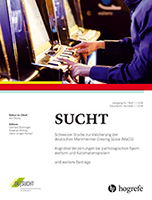
Sucht-Zeitschrift fur Wissenschaft und Praxis
Empowering interdisciplinary insights into addiction and recovery.Sucht-Zeitschrift für Wissenschaft und Praxis, published by HOGREFE AG in Switzerland, is a pivotal journal addressing the interrelated fields of addiction science and mental health. With an ISSN of 0939-5911 and an E-ISSN of 1664-2856, this journal has been dedicated to fostering interdisciplinary research and practical applications since its inception in 1991, continuing through to 2024. As a respected source in the field, it holds a 2023 Q3 quartile ranking in Medicine (miscellaneous), a Q4 ranking in Psychiatry and Mental Health, and a Q3 ranking in Public Health, highlighting its broad relevance and growing impact on contemporary health discussions. While currently not offering open access options, the journal provides a rich platform for researchers, practitioners, and students to share and gain insights into innovative practices and scientific findings that advance the understanding of addiction and its societal implications. With its contributions indexed in Scopus and a variety of rankings reflective of its quality, Sucht-Zeitschrift für Wissenschaft und Praxis serves as an essential resource for those committed to advancing knowledge and practice in addiction-related fields.
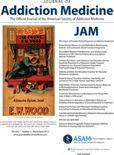
Journal of Addiction Medicine
Transforming Understanding of Addiction ChallengesWelcome to the Journal of Addiction Medicine, a premier academic resource devoted to the field of addiction studies, published by LIPPINCOTT WILLIAMS & WILKINS. Since its inception in 2007, this esteemed journal has become a leader in disseminating groundbreaking research, with impressive rankings in the Q1 quartile across key disciplines such as Medicine (Miscellaneous), Pharmacology (Medical), and Psychiatry and Mental Health, reflecting its significance in the scholarly community. With an ISSN of 1932-0620 and an E-ISSN of 1935-3227, it caters to a diverse audience of researchers, clinicians, and students seeking to expand their understanding of addiction medicine. The journal's articles are primarily published in a non-open access format, ensuring high-quality research is accessible through institutional subscriptions. With a Scopus ranking that positions it within the top tiers of several relevant categories, the Journal of Addiction Medicine is essential for anyone committed to advancing knowledge in the field and addressing the complexities surrounding addiction.
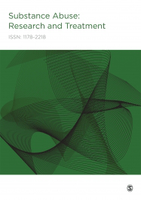
Substance Abuse-Research and Treatment
Connecting researchers and practitioners to combat substance use issues.Substance Abuse: Research and Treatment is a premier open-access journal published by SAGE Publications Ltd, focusing on the multifaceted aspects of substance use and its impact on mental health. Since its establishment in 2008, this journal has been dedicated to disseminating innovative research findings, case studies, and reviews that enhance understanding and treatment of substance-related disorders. With an impact factor that reflects its standing in the field, currently ranked in the Q2 category of Psychiatry and Mental Health, Substance Abuse: Research and Treatment strives to foster interdisciplinary dialogue among researchers, practitioners, and students. By making its content freely accessible, the journal encourages widespread engagement and application of evidence-based practices to mitigate substance abuse issues. The journal’s diverse global perspectives make it a vital resource for anyone invested in advancing knowledge and improving treatment outcomes in this critical area of public health.